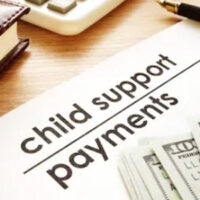Delayed Income Withholding Orders In Florida Child Support Cases

There are a few different ways that parents can pay child support in Florida. For instance, the parent required to pay child support could make those payments directly to the state, which would then process the payment at its Central Depository before sending it to the other co-parent. Many couples, however, opt instead to pay child support directly from one parent to the other. In these cases, many parents also agree to the entering of a delayed income withholding order, which goes into effect in the event that a parent is late when making a payment.
What is a Delayed Income Withholding Order?
A delayed income withholding order is a type of legal order that goes into effect when a parent is late on a child support payment. These orders essentially cancel direct payments, transferring authority to receive and process child support to Florida’s Central Depository. How late a parent has to be in paying for these orders to go into effect will depend on the agreement and the order in question. Some agreements, for instance, state that a delayed income withholding order will become effective only after a payment is ten or more days late. This is why the specifics of a couple’s agreement will largely dictate his or her next steps when it comes to collecting overdue child support. Fortunately, even when two parents don’t have a delayed income withholding agreement in place, the state can still step in and collect payments directly from a non-paying spouse’s employer.
How is Income Withheld for Overdue Child Support?
When a parent violates a direct child support payment agreement, then the state can begin withholding those payments after sending an income withholding notice to the parent’s employer. Upon receipt, the employer will begin withholding the amount of the support payment from the parent’s wages and then sending that amount to the Florida State Disbursement Unit. This agency will be responsible for sending the payment directly to the recipient parent. Withholding income from a parent’s wages or salary is, however, not the only way that the state can obtain child support payments from a non-compliant parent. Instead, they can also withhold payments from other income sources, such as social security benefits, retirement or pension benefits, self-employment income, bonuses, commissions, and even overtime pay.
An Experienced Florida Child Support Lawyer
The rules regarding child support in Florida can be confusing, which is why divorcing parents are often encouraged to work with a family law attorney who can walk them through the ins and outs of their financial obligations and rights. If you and your co-parent agreed to a direct payment of child support and a delayed income withholding order, but he or she hasn’t paid, you could be entitled to payment via withholding. For help enforcing this order, please call experienced Fort Lauderdale child support lawyer Sandra Bonfiglio, P.A. at 954-945-7591 today. You can also set up a free consultation to discuss your questions and concerns by reaching out to our legal team through an online message.
Sources:
flsenate.gov/Laws/Statutes/2018/Chapter88/All
floridarevenue.com/childsupport/compliance/Pages/income_withholding.aspx#







